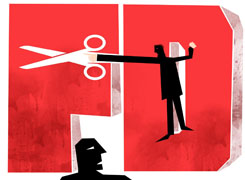Should I Be Concerned About TDS on My FD Interest?
Mahesh Padmanabhan | Answer |Ask -Follow
Tax Expert - Answered on Aug 16, 2024
He is a member of The Institute of Chartered Accountants of India and has a degree in cost accounting from the Institute of Cost Accountants of India.
He is also a qualified information systems auditor. ... more

Interest income on fd does not exceeds 40000 yet tds 10 percent is deducted, why. Suppose fd of 25 lakh and 2 fds and for 46 days at 4.5 percent tds gets deducted at about 5500 . Pls explain this
Assuming that the interest is out of deposit with an eligible institution viz., Bank, Coop Bank & Post Office, the threshold amount is Rs. 40,000 otherwise the threshold would be Rs. 5,000. If your interest is from the eligible institutions then you will need to speak with them.
You may like to see similar questions and answers below
Hardik Parikh | Answer |Ask -Follow
Tax, Mutual Fund Expert - Answered on Jul 26, 2023
Ramalingam Kalirajan |10893 Answers |Ask -Follow
Mutual Funds, Financial Planning Expert - Answered on Feb 07, 2025
Ramalingam Kalirajan |10893 Answers |Ask -Follow
Mutual Funds, Financial Planning Expert - Answered on Dec 15, 2025
Ramalingam Kalirajan |10893 Answers |Ask -Follow
Mutual Funds, Financial Planning Expert - Answered on Dec 15, 2025
Radheshyam Zanwar |6746 Answers |Ask -Follow
MHT-CET, IIT-JEE, NEET-UG Expert - Answered on Dec 15, 2025
Ramalingam Kalirajan |10893 Answers |Ask -Follow
Mutual Funds, Financial Planning Expert - Answered on Dec 15, 2025
Ramalingam Kalirajan |10893 Answers |Ask -Follow
Mutual Funds, Financial Planning Expert - Answered on Dec 15, 2025
Ramalingam Kalirajan |10893 Answers |Ask -Follow
Mutual Funds, Financial Planning Expert - Answered on Dec 15, 2025
Samraat Jadhav |2508 Answers |Ask -Follow
Stock Market Expert - Answered on Dec 15, 2025
Ramalingam Kalirajan |10893 Answers |Ask -Follow
Mutual Funds, Financial Planning Expert - Answered on Dec 15, 2025
Reetika Sharma |425 Answers |Ask -Follow
Financial Planner, MF and Insurance Expert - Answered on Dec 15, 2025
Radheshyam Zanwar |6746 Answers |Ask -Follow
MHT-CET, IIT-JEE, NEET-UG Expert - Answered on Dec 15, 2025

























